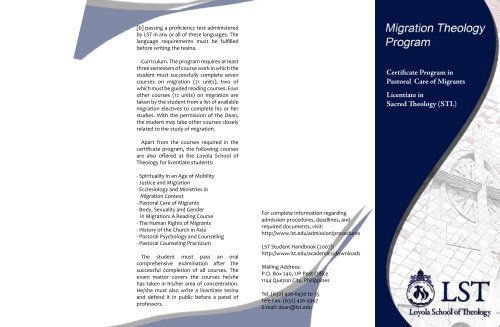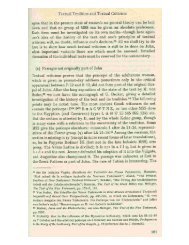Migration Theology Program - Loyola School of Theology
Migration Theology Program - Loyola School of Theology
Migration Theology Program - Loyola School of Theology
Create successful ePaper yourself
Turn your PDF publications into a flip-book with our unique Google optimized e-Paper software.
[b] passing a pr<strong>of</strong>iciency test administered<br />
by LST in any or all <strong>of</strong> these languages. The<br />
language requirements must be fulfilled<br />
before writing the tesina.<br />
Curriculum. The program requires at least<br />
three semesters <strong>of</strong> course work in which the<br />
student must successfully complete seven<br />
courses on migration (21 units), two <strong>of</strong><br />
which must be guided reading courses. Four<br />
other courses (12 units) on migration are<br />
taken by the student from a list <strong>of</strong> available<br />
migration electives to complete his or her<br />
studies. With the permission <strong>of</strong> the Dean,<br />
the student may take other courses closely<br />
related to the study <strong>of</strong> migration.<br />
Apart from the courses required in the<br />
certificate program, the following courses<br />
are also <strong>of</strong>fered at the <strong>Loyola</strong> <strong>School</strong> <strong>of</strong><br />
<strong>Theology</strong> for licentiate students:<br />
- Spirituality in an Age <strong>of</strong> Mobility<br />
- Justice and <strong>Migration</strong><br />
- Ecclesiology and Ministries in<br />
<strong>Migration</strong> Context<br />
- Pastoral Care <strong>of</strong> Migrants<br />
- Body, Sexuality and Gender<br />
in <strong>Migration</strong>: A Reading Course<br />
- The Human Rights <strong>of</strong> Migrants<br />
- History <strong>of</strong> the Church in Asia<br />
- Pastoral Psychology and Counseling<br />
- Pastoral Counseling Practicum<br />
The student must pass an oral<br />
comprehensive examination after the<br />
successful completion <strong>of</strong> all courses. The<br />
exam matter covers the courses he/she<br />
has taken in his/her area <strong>of</strong> concentration.<br />
He/she must also write a licentiate tesina<br />
and defend it in public before a panel <strong>of</strong><br />
pr<strong>of</strong>essors.<br />
For complete information regarding<br />
admission procedures, deadlines, and<br />
required documents, visit:<br />
http://www.lst.edu/admission/procedures<br />
LST Student Handbook (2007):<br />
http://www.lst.edu/academics/downloads<br />
Mailing Address:<br />
P.O. Box 240, UP Post Office<br />
1144 Quezon City, Philippines<br />
Tel. (632) 426-6430 to 35<br />
tele-Fax. (632) 426-5967<br />
E-mail: dean@lst.edu<br />
<strong>Loyola</strong> <strong>School</strong> <strong>of</strong> <strong>Theology</strong><br />
Graduate <strong>Program</strong> in Biblical Exegesis<br />
Certificate <strong>Program</strong> in<br />
Pastoral Care <strong>of</strong> Migrants<br />
Licentiate in<br />
Sacred <strong>Theology</strong> (STL)<br />
MA in Biblical Exegesis<br />
PhD in Biblical Exegesis<br />
www.lst.edu<br />
Ateneo de Manila University<br />
<strong>Loyola</strong> Heights, Quezon City, Philippines
<strong>Migration</strong> is a growing phenomenon in<br />
Asia, and all indications suggest that it will<br />
remain an important aspect <strong>of</strong> the region’s<br />
landscape. The local churches in countries<br />
<strong>of</strong> origin and destination in Asia are called to<br />
promote theological reflection and studies<br />
on this phenomenon.<br />
The instruction Erga Migrantes Caritas<br />
Christi states: “Episcopal Conferences<br />
will likewise entrust to Catholic university<br />
faculties in their territories the task <strong>of</strong><br />
studying the various aspects <strong>of</strong> migration<br />
more thoroughly for the benefit <strong>of</strong> concrete<br />
pastoral service for migrants. Compulsory<br />
courses <strong>of</strong> theological specialization could<br />
also be programmed for this purpose”<br />
(EMCC, 71).<br />
To answer this call, <strong>Loyola</strong> <strong>School</strong> <strong>of</strong><br />
<strong>Theology</strong>, the Episcopal Commission for<br />
the Pastoral Care <strong>of</strong> Migrants and Itinerant<br />
Peoples (CBCP-EMCI), and the Scalabrini<br />
<strong>Migration</strong> Center (SMC) have established a<br />
special program in <strong>Migration</strong> <strong>Theology</strong>. The<br />
program is tailored to meet the different<br />
needs <strong>of</strong> lay pastoral workers, religious, and<br />
ordained persons involved in this ministry.<br />
It also aims to train students <strong>of</strong> theology in<br />
addressing this important concern <strong>of</strong> the<br />
Church today.<br />
Certificate <strong>Program</strong> in<br />
the Pastoral Care <strong>of</strong> Migrants<br />
The requirements for enrolling in the<br />
Certificate <strong>Program</strong> are the following:<br />
- pro<strong>of</strong> <strong>of</strong> pr<strong>of</strong>iciency in the English language<br />
through the LST English Pr<strong>of</strong>iciency Test<br />
- accomplished application and registration<br />
forms<br />
- a letter <strong>of</strong> recommendation from the<br />
superior, bishop, or <strong>of</strong>ficial <strong>of</strong> the applicant’s<br />
institution<br />
- at least 2 years <strong>of</strong> college (or its equivalent)<br />
and a basic theology course<br />
The required five courses for this program<br />
are <strong>of</strong>fered during the first semester <strong>of</strong> each<br />
academic year (from June to October).<br />
Four courses are compulsory; one subject<br />
is chosen from a list <strong>of</strong> elective migration<br />
courses. All courses are open to auditors.<br />
MTP01 Introducing Theologies <strong>of</strong><br />
<strong>Migration</strong><br />
MTP02 The Bible and People <strong>of</strong> God on<br />
the Move: A Reading Course<br />
MTP03 <strong>Migration</strong> in the Catholic Social<br />
Teaching<br />
MTP04 Management <strong>of</strong> Pastoral<br />
<strong>Program</strong>s in <strong>Migration</strong><br />
MTP One course may be chosen<br />
from the other migration<br />
course <strong>of</strong>ferings<br />
Licentiate in<br />
Sacred <strong>Theology</strong> (STL)<br />
Application. For admission into the<br />
Licentiate in Sacred <strong>Theology</strong> <strong>Program</strong><br />
with a field <strong>of</strong> specialization in <strong>Migration</strong><br />
<strong>Theology</strong>, applicants must hold a Bachelor’s<br />
degree in Sacred <strong>Theology</strong> (STB), issued by<br />
an ecclesiastical faculty <strong>of</strong> theology. They<br />
must also have at least a general average <strong>of</strong><br />
2.0 (B+). Those who have finished four years<br />
<strong>of</strong> theology from a school <strong>of</strong> theology that<br />
does not <strong>of</strong>fer the S.T.B. may still qualify<br />
for the STL program provided they have<br />
the same average grade as above and can<br />
<strong>of</strong>fer some pro<strong>of</strong> <strong>of</strong> their capacity to write<br />
a tesina (e.g., a research paper they have<br />
written in their seminary course).<br />
Licentiate applicants must pass an<br />
Entrance Exam administered by the Ateneo<br />
de Manila and an LST English Pr<strong>of</strong>iciency<br />
Test. They are admitted to the STL program<br />
upon the recommendation <strong>of</strong> the Standards<br />
& Degrees Committee and the approval <strong>of</strong><br />
the Dean.<br />
Language Requirements. Besides English,<br />
the licentiate student needs to have a<br />
reading knowledge <strong>of</strong> one modern language<br />
in which significant theological writing<br />
has been done (e.g., German, French,<br />
Spanish, Italian). He/she must also have a<br />
working knowledge <strong>of</strong> Biblical Hebrew or<br />
Greek, and Latin. The requirements may<br />
be satisfied either by [a] taking language<br />
courses <strong>of</strong> two semesters each language in<br />
any language institute or university; or by



